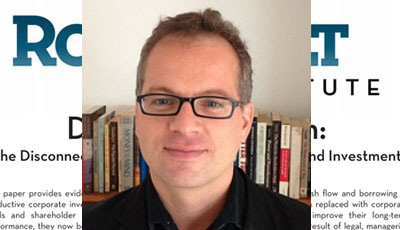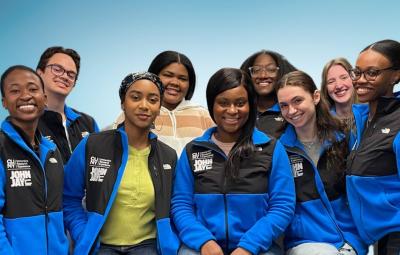
Assistant Professor J. W. Mason of the Economics Department has garnered media attention for his recent Roosevelt Institute paper titled “Disgorge the Cash: The Disconnect Between Corporate Borrowing and Investment.” The Washington Post, Time Magazine, the Los Angeles Times and others have cited Mason’s work on the decline in corporate investments and increase in borrowing to bolster shareholders.
Mason is a macroeconomist specializing in Post Keynesian approaches to finance and international trade. His current research focuses on the history and political economy of credit, including the evolution of household debt and changing role of financial markets in business investment. He also works on history of economic thought, particularly the development of macroeconomics over the twentieth century. Ge has done policy work for the New York Working Families Party and the AFL-CIO, and has published popular articles in The Nation, In These Times, The American Prospect, The Baffler, and The Jacobin, among other venues. His blog on economics and politics can be found at slackwire.blogspot.com.
The follow are highlights of his recent coverage.
Washington Post
“Why companies are rewarding shareholders instead of investing in the real economy”
By Lydia DePillis
February 25, 2015
Excerpt: “The health of the financial system might matter less for the real economy than it once did,” writes J.W. Mason, an assistant professor of economics at John Jay College who wrote the paper, "because finance is no longer an instrument for getting money into productive businesses, but for getting money out of them."
Time Magazine
Why Finance Is Still a Problem
By Rana Foroohar
March 9, 2015
Excerpt: “Part of the problem with the rise of finance is that it encourages the culture of shareholder value over all else. That means CEOs focus more on buoying stock prices rather than making the best long-term decisions. The effects can be seen in the fact that since the 1980s, share buybacks and dividend payments have increased in direct proportion to a decrease in productive capital investment, according to a recent Roosevelt Institute paper entitled “Disgorge the Cash: The Disconnect Between Corporate Borrowing and Investment.” What’s more, says JW Mason, a Roosevelt fellow who authored the paper…”
Los Angeles Times
Hewlett-Packard shows how to fatten shareholders while firing workers
By Michael Hiltzik
February 25, 2015
Excerpt: “H-P isn't alone in putting shareholders first through buybacks and dividends. A new study by the Roosevelt Institute documents the trend across the corporate landscape. ‘Whereas firms once borrowed to invest and improve their long-term performance," observes its author, J.W. Mason, "they now borrow to enrich their investors in the short-run.’”
The Week
How the rich devoured the American corporation — and what we can do about it
By Ryan Cooper
March 11, 2015
Excerpt: “Let's examine corporations first. Another economist, professor J.W. Mason of City University of New York, has been developing a much more convincing thesis to explain the decline of corporate investment. He argues, most recently in a working paper for the Roosevelt Institute, that it is a result of a political struggle over the profits created by firms.”
Daily Kos blog
Economics Daily Digest: Missing the monetary policy mark, participatory budgeting, and a goodbye
Washington Post
The fringe economic theory that might get traction in the 2016 campaign
Washington Post
Shareholders’ big skim
Startribune
Inside Target's growth plan, buybacks play a strong role
International Business Times
Corporate Borrowing Now Flows To Shareholders, Not Productive Investment: Study
The Stranger
What William Gibson's "New Rose Hotel" Got Wrong About the Future



